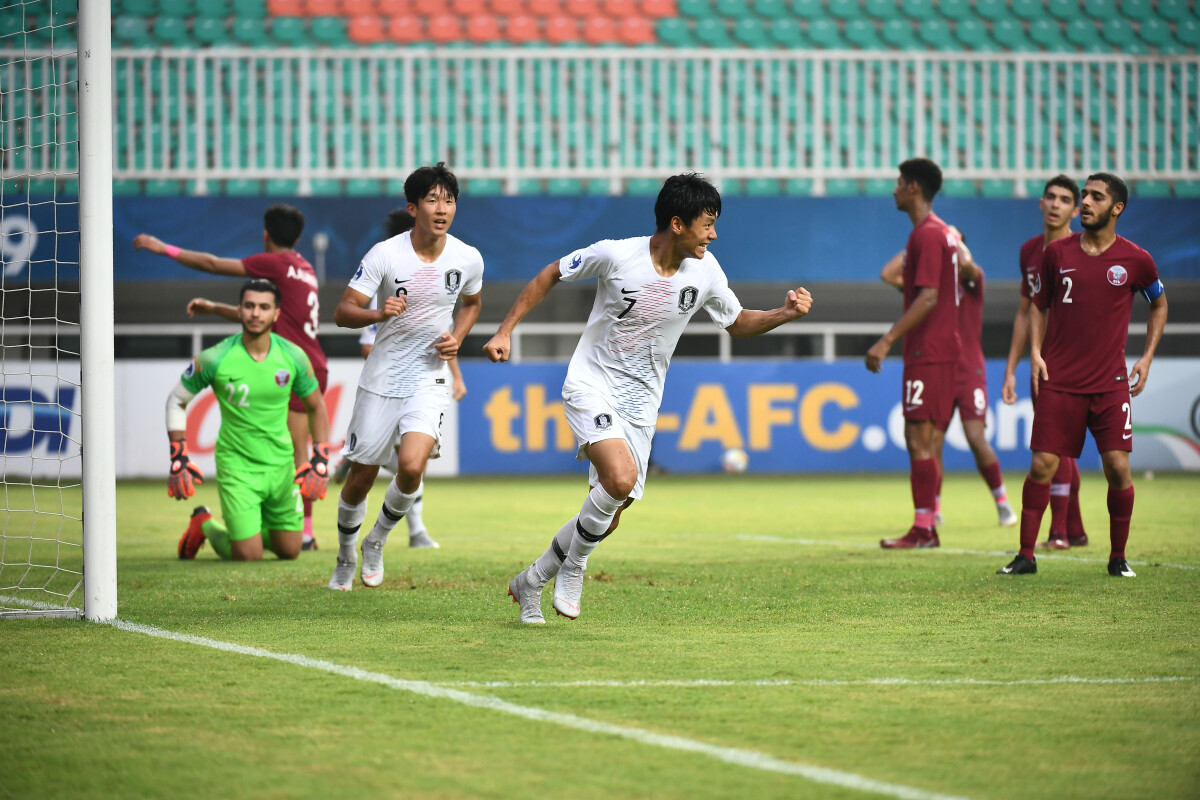
Thu, 28 Oct, 2021

Kuala Lumpur: Korea Republic face a daunting task at the upcoming FIFA U-20 World Cup Poland 2019 with their group opponents being none other than six-time winners Argentina, as well as Portugal and South Africa. Despite the formidable opponents, though, forward Jeon Se-jin remains unfazed.
Instead, he is relishing the opportunity to rub shoulders with the world's best players. "Many say it is the toughest group," the 19-year-old Suwon Bluewings striker said.
"The fans are seemingly concerned about the group rivals because they are among the world's finest teams. But I am looking forward to it as I am excited to compete against the best teams.
www.the-afc.com/en/more/photo/afc_u-19_championship_2018_-_korea_republic_vs_australia.html
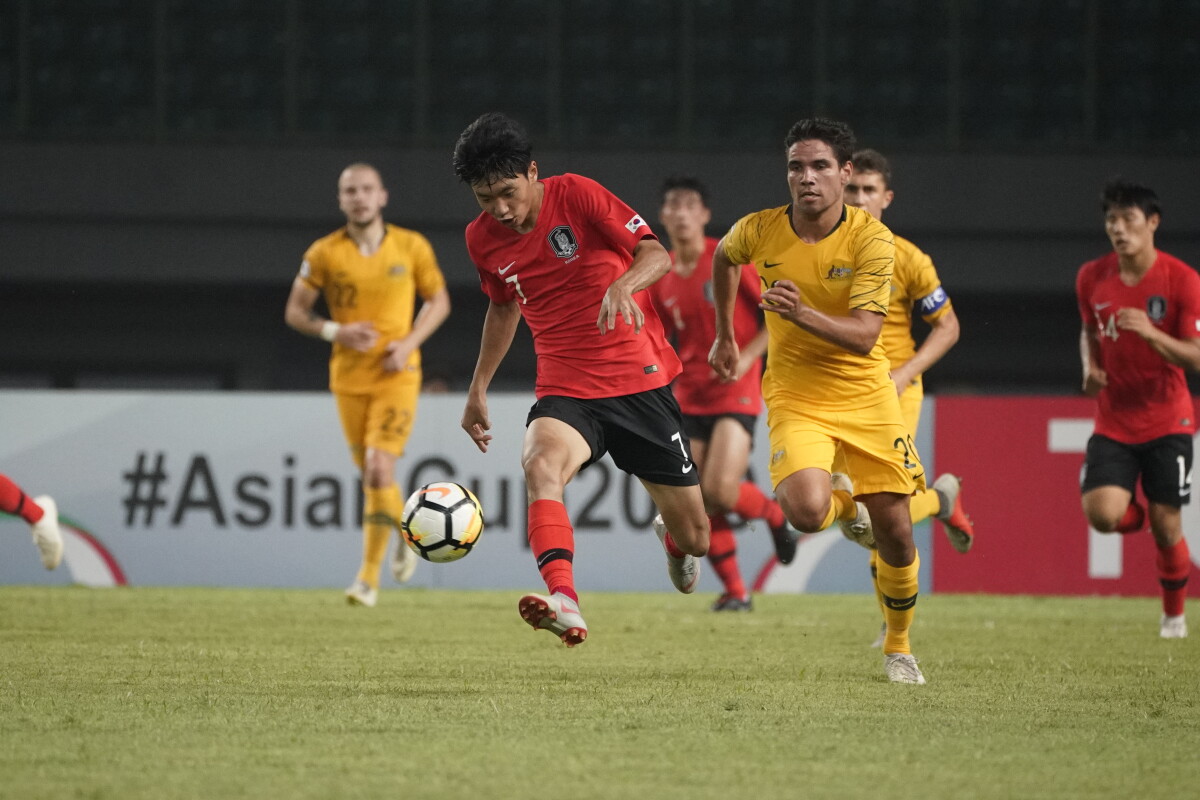
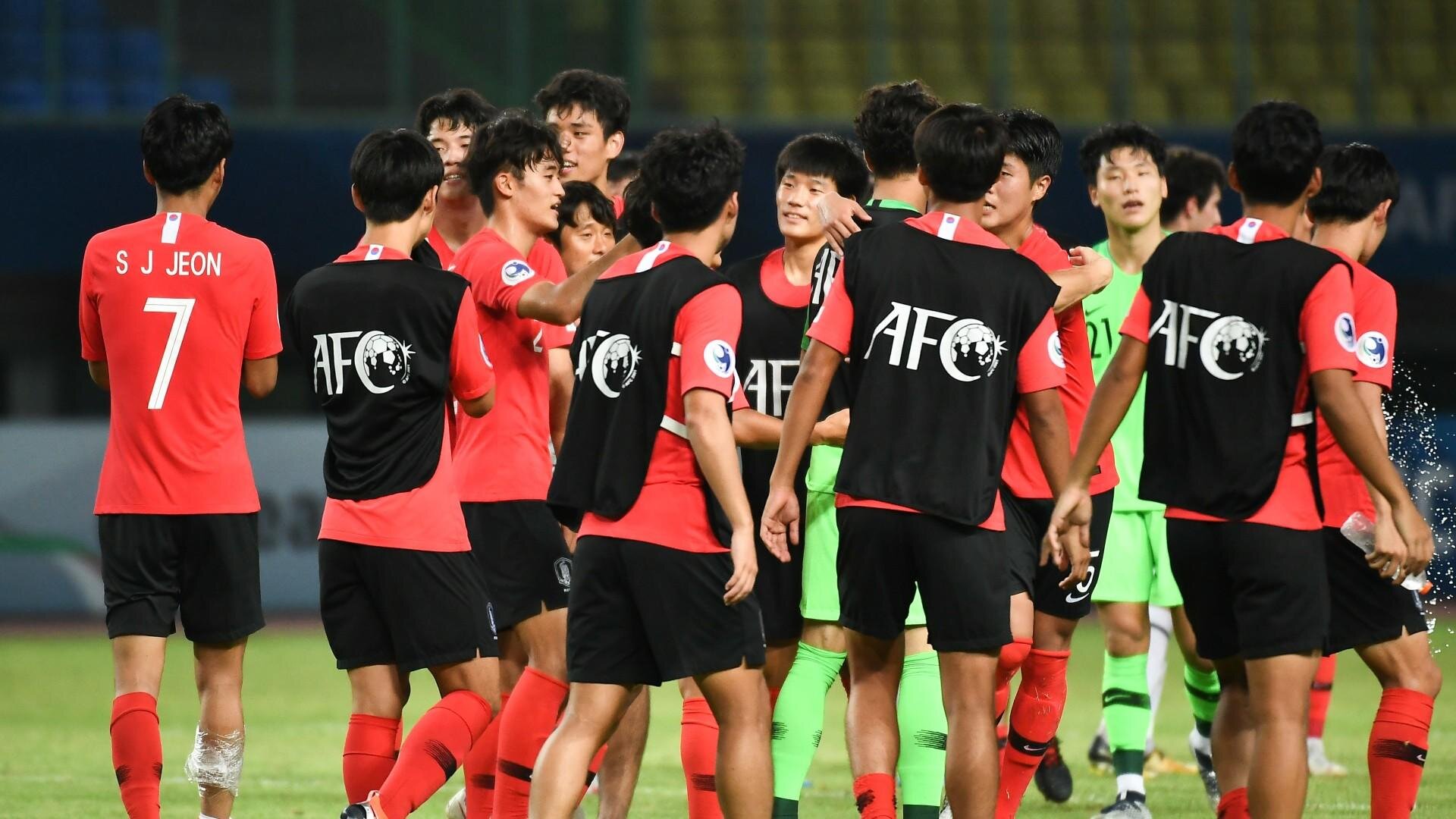
www.the-afc.com/en/more/photo/jeon_se-jin_-_2018_afc_u-19_.html
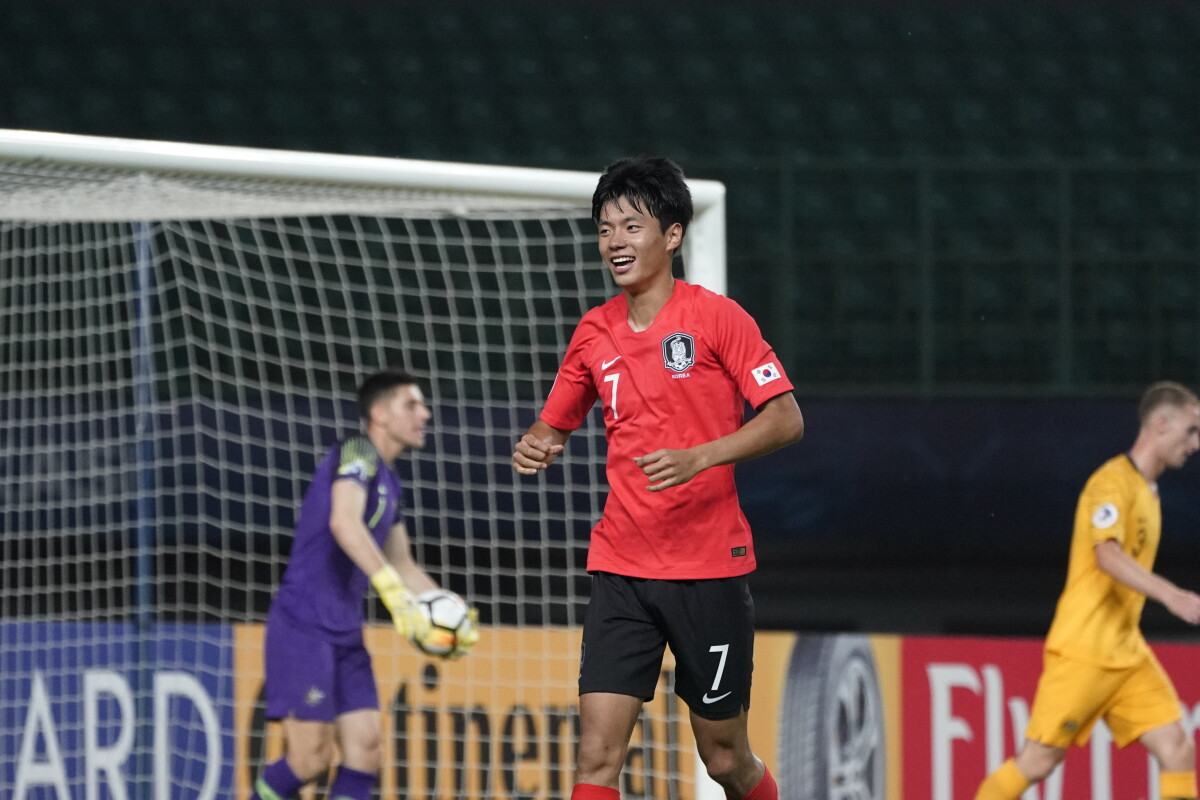
Thu, 28 Oct, 2021

Kuala Lumpur: 13 Asian officials have been appointed for the upcoming FIFA U-20 World Cup Poland 2019, with the contingent led by referees Ahmed Al Kaf (Oman), Muhammad bin Jahari (Singapore) and Adham Makhadmeh (Jordan).
The three referees officiated in the AFC Asian Cup UAE 2019 and are regularly in charge of AFC Champions League matches, with Oman’s Al Kaf taking charge of the 2018 final second leg tie between Persepolis and Kashima Antlers last November, where he was assisted by compatriots Abu Bakar Al Amri and Rashid Al Ghaithi, who will also be in Poland 2019.
Thu, 28 Oct, 2021
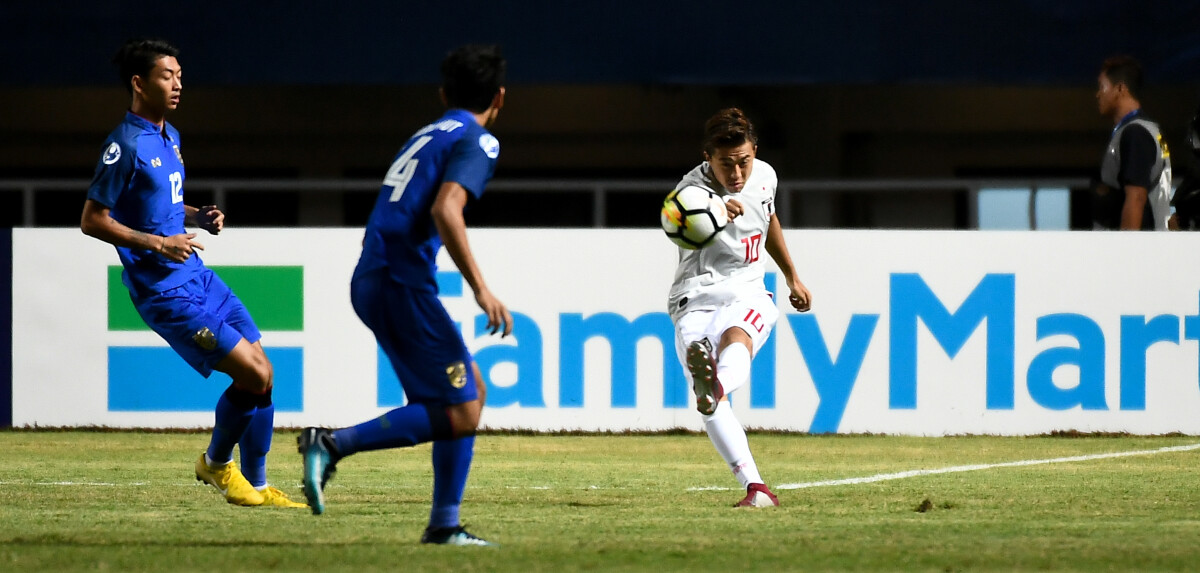
Kuala Lumpur: Winning the AFC Champions League, claiming J.League Rookie of the Year and scoring at the FIFA Club World Cup − 2018 was certainly a memorable year in the fledgling career of Hiroki Abe.
Now wearing the Number 10 jersey at Kashima Antlers, the 20-year-old is hungry for more success this year, for both club and country.
While currently focused on Kashima’s domestic and Continental campaigns which began last month, Abe will be hoping to impress for Japan at the FIFA U-20 World Cup Poland 2019 in May.
Thu, 28 Oct, 2021
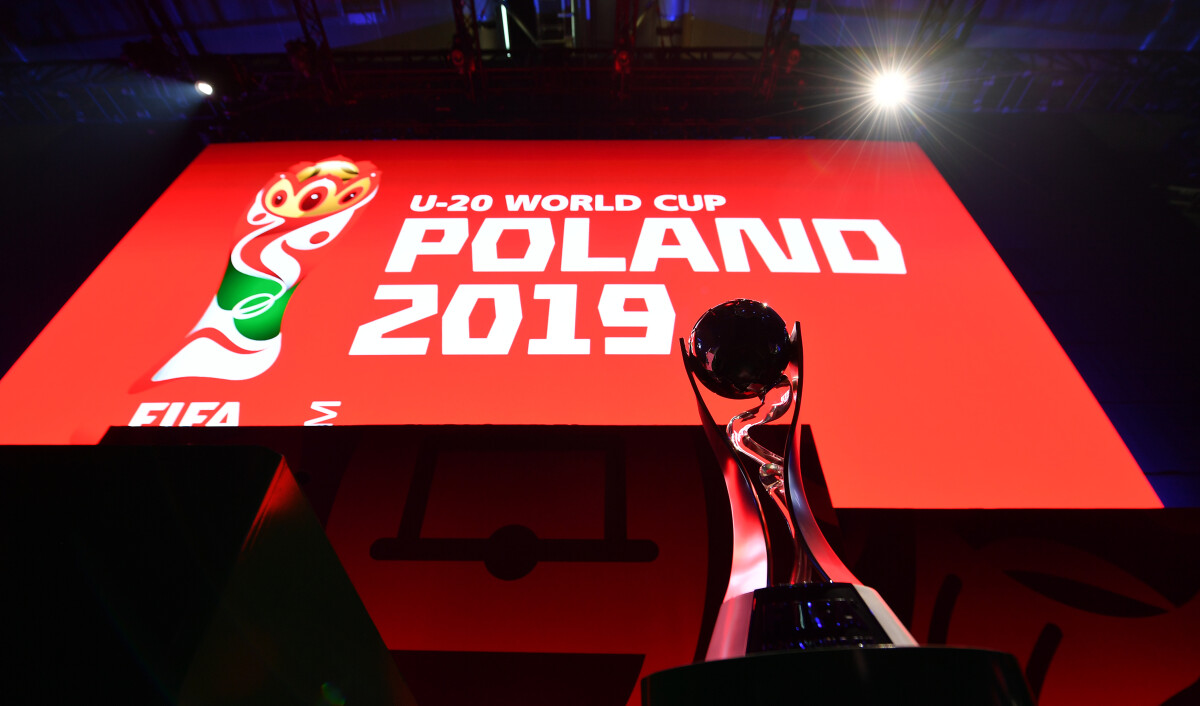
Gydnia: Asia's best learnt their FIFA U-20 World Cup Poland 2019 contenders following the official draw at the Gydnia Arena in Poland on Sunday.
Saudi Arabia, the 2018 AFC U-19 Championship winners, were drawn in Group E with France, Mali and Panama.
Japan, defeated 2-1 by Saudi Arabia in the 2018 AFC U-19 Championship final, will play in Group B with the 1999 runners-up having Mexico, Italy and Ecuador for company.
Korea Republic were drawn in Group F with six-time champions Argentina, twice winners Portugal and South Africa, while 1981 runners-up Qatar, will play in Group D with Nigeria, Ukraine and USA.
Thu, 28 Oct, 2021
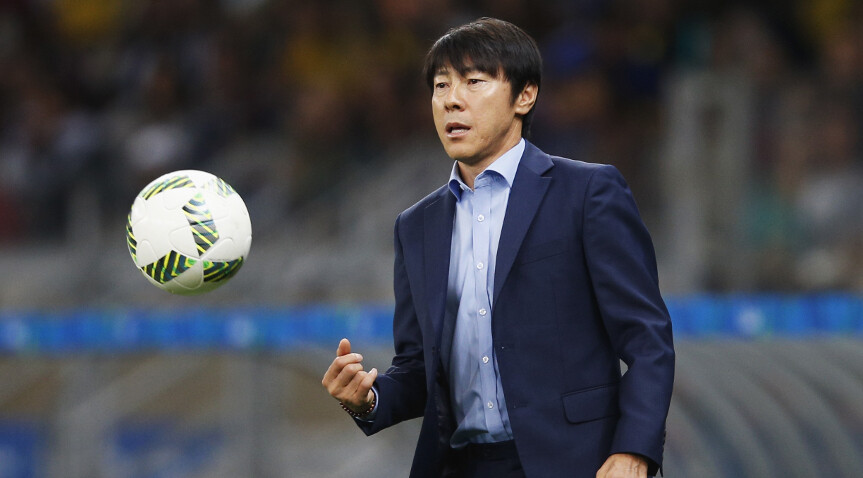
Seoul: Having only been appointed coach of the Korea Republic U-20 team last November, Shin Taey-ong does not exactly have time on his side. With a mere five months to go before the FIFA U-20 World Cup Korea Republic 2017 gets underway, Shin is busy assessing his squad in Portugal, where they are currently based for an extended training camp and series of friendlies.
This comes in the wake of a two-week training camp in Jeju at the end of last year. Indeed, the coach and his charges will also be foregoing their traditional Lunar New Year holiday, which begins this weekend, opting instead to sweat it out in training. That said, Shin is no stranger to a challenge or being the man in the spotlight.
During a legendary playing career spanning 13 seasons, he racked up 401 games, scored 99 goals and made 68 assists, leading Ilwha Chunma to six K League championships along the way. In late 2008, Shin started his coaching career in Seongnam as the helm of the club where he enjoyed so much success as a player. Later, after the FIFA World Cup Brazil 2014, he filled the managerial void by becoming interim head coach of the Korea Republic senior team. In February of the following year, he was given responsibility for the U-23 team and led the Taeguk Warriors to the quarter-finals of the Olympic Football Tournament Rio 2016.
As such, Shin Tae-yong is taking this new situation in his stride. “In life, everyone has disappointing moments,” he told FIFA.com in Seogwipo last month. “I would have preferred to take things on from the very beginning, but I think coming in mid-cycle was also important. To be called on in times of trouble and have people think ‘We don’t have much time, but we can probably make it with this guy’ is something I regard as positive.”
With only a tight schedule to work with, the first order of business for Shin was to select 35 players from among those used by his predecessor, Ahn Ik-soo, and evaluate their performance levels at the Jeju training camp. For the Portugal get-together currently underway, the squad had to be further whittled down to 25. Not an easy task for a man who, despite a fantastic club career, had few chances to shine with the national team.
“Of course, it really hurts. When it involves guys you’ve suffered or rejoiced with, then deciding who can and cannot go is bound to disappoint some players. But I try to instil some confidence in them,” Shin said. “I played fairly successfully for my club team, but the reason I never played well for the national side was because I felt peer pressure from senior players. That meant I could never play the way I wanted to. If I’d played the same way I did for my club, then perhaps the national team would have performed better – but I never got to do that. Therefore, I train my players so that they’re able to show all their talents on the pitch and perform with confidence,” he added.
Shin is familiar with the Spartan training style of Park Jong-hwan, the coach who led the South Koreans to the semi-finals at the FIFA U-20 World Cup Mexico 1983 and oversaw Ilwha Chunma’s glory days. Though he wore the captain’s armband and shone charismatically under Park’s brand of football, Shin’s coaching philosophy is completely different to that of his former boss.
“In our time, the style of football differed greatly from coach to coach, and that was difficult for us. We played football with a lot of restraint. I think if players are to develop, they have to play to their abilities. Instead of the coach saying ‘do this, do that’, I think he should present the big picture of what he wants and allow the players to make it happen. It shouldn’t be done in a coercive atmosphere, but rather one that nurtures players. I think better results can be achieved by letting the players do what they can by themselves,” he explained.
While in charge of the U-23 team, Shin’s coaching philosophy became known as “brotherly leadership”, and among this group of players, Shin often hears himself being compared to a “neighbourhood ajusshi (dad)”. That paternal relationship may also have something to do with some of the current U-20 squad having played with Shin’s eldest son, Jae-won, during the qualifying phase of the FIFA U-17 World Cup Chile 2015.
“They’re friends with my eldest son. The age gap is similar to that of father and son, so I’m an ajusshi to them,” laughed Shin. “My eldest son took part in the Asian qualifying for the U-17 World Cup, but then he suffered a fatigue fracture, had to sit out seven months and missed the World Cup. So I told him that as long as I’m in charge, he cannot make the U-20 team. There could be a misunderstanding. I told him, ‘I’m sorry, but this time you have to make a sacrifice for your father. I’m not going to say anything about your true talent, because you’re good at judging it, but if you were to come into the national team while I’m in charge, it would be problematic.’ He was disappointed, but we can’t do anything about it.”
Though he tends to prefer attacking, aggressive football, Shin Tae-yong has not set concrete goals just yet for his charges, instead focusing on instilling a positive mindset among them. “I’ve not thought about goals so far, as we haven’t played a game with a full-strength line-up yet. We’ll have a better idea after the Suwon JS Cup concludes in March. That being said, because this World Cup is being hosted in our country, I think we need to reach at least the quarter-finals, or even go beyond that.”
In order for Shin Tae-yong to achieve that objective, he will need the enthusiastic help of the home supporters, as he explained with our interview drawing to a close. “I’d like it if we managed to get as many of the country’s football fans behind us as possible. I think that our young players will achieve better results and draw strength from our supporters if they show up in droves like for the 2002 World Cup. I believe that fans enable players to give it their all. So I say to everyone, ‘If you give us your support and encourage us, we will accomplish even greater things’.”
Sources: FIFA.com, FIFA/Getty Images
Thu, 28 Oct, 2021
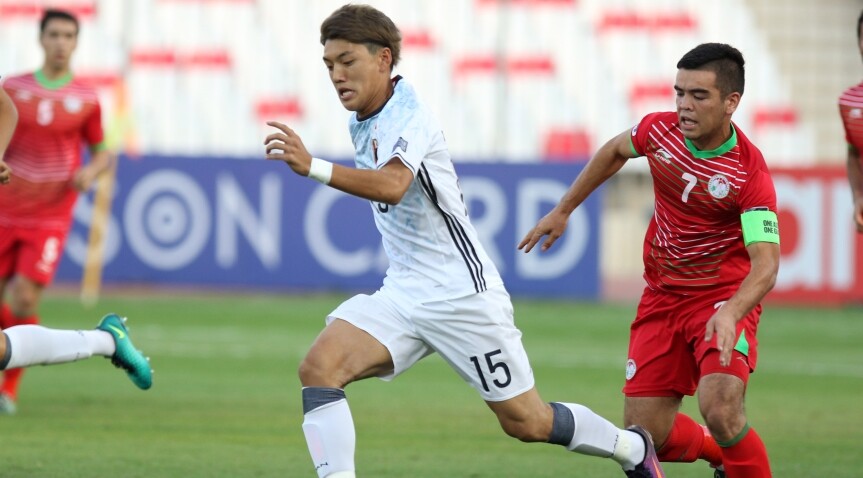
Tokyo: Having been crowned MVP at last year's AFC U-19 Championship Bahrain after helping Japan win that tournament for the first time, Ritsu Doan is aiming to shine on the global stage at May's FIFA U-20 World Cup Korea Republic. The diminutive midfielder is also looking to reprise a piece of his nation’s football history.
In 1999, the year after Doan was born, a talented Japan side took the U-20 World Cup by storm, finishing surprise runners-up – their best achievement in the tournament to date. Spearheading that golden generation was Shinji Ono (pictured below), a midfielder who had picked up the AFC U-19 Championship MVP award before inspiring Japan’s run to the final in Nigeria. Now, with Doan having become just the second Japanese to claim the Asian qualifiers’ top individual award, the ambitious youngster is aiming to take up the former Western Syndey Wanderers star’s mantle.
"He (Ono) is a great player and of course I want to become a good footballer like him," the 18-year-old Gamba Osaka winger told FIFA.com. "Those players (Japan’s 1999 U-20 side) are our heroes; they lifted Japanese football to a new level. It will be important for us to put in good performances (in Korea) if we are to follow in their big footsteps."
Thu, 28 Oct, 2021
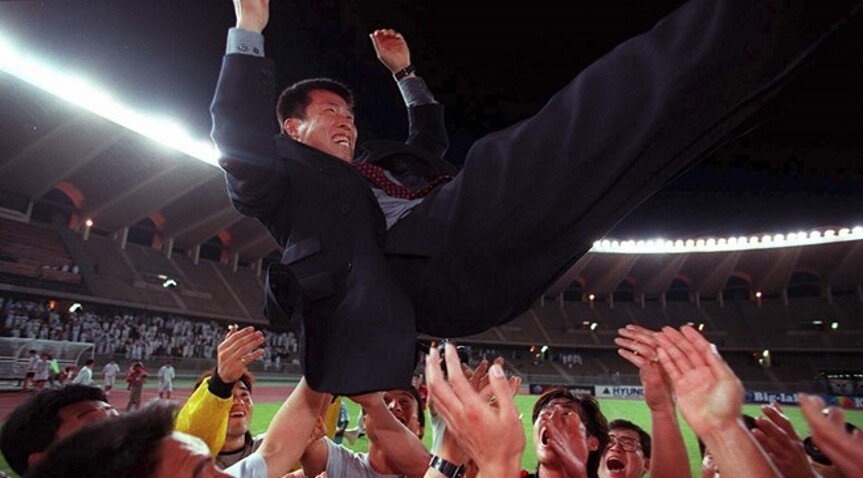
Seoul: Youngsters playing in the schoolyards from Seoul to Busan ritually re-enact moments from Korea Republic’s fairytale run to the semi-finals of the 2002 FIFA World Cup Korea/Japan™. Park Ji-sung’s volley against Portugal in the Group Stage and subsequent hug with Guus Hiddink, Ahn Jung-hwan’s golden goal against Italy and captain Hong Myung-bo’s winning penalty against Iker Casillas and Spain are among the moments that will live forever in the country’s collective memory. However, before the days of Park, Hong or Ahn, there was a player who paved the way for Korean football to make the next step on the global stage and one whose name will be synonymous with Asian football forever: Cha Bum-kun
Affectionately nicknamed, Cha Boom, he was a pioneer as the first ever Korea Republic footballer to be signed by a European club - Darmstadt in 1978 - playing for Eintracht Frankfurt and Bayer Leverkusen for the majority of his career. Cha is also an example of success experienced by playing for the national team’s youth ranks. This is precisely why his role as vice-chairman of the Local Organising Committee for the FIFA U-20 World Cup Korea Republic 2017 could not be better suited for anyone else. Not only is Cha a great example for aspiring professionals to look up to for his on-field excellence, his humility and discipline (he famously only received one yellow card in his whole career) are attributes for every young professional to try and emulate.
To mark 100 days to go to the FIFA U-20 World Cup Korea Republic 2017, FIFA.com sat down for an exclusive chat with one of the all-time great Taeguk Warriors to look ahead to the tournament and reflect on his career.
FIFA.com: Not only are you seen as one of the greatest players in Korea Republic’s history, but you have a personal connection to the U-20 level. What do you remember from your first days breaking through the South Korean national team system?
Cha Bum-kun: I joined the youth national team when I was in high school. I was just a country boy who never even had a chance to get on an airplane, and then I became a youth international and flew to Japan [to take part in the 1971 AFC U-19 Championship]. I cannot express what I felt in words because it was my boyhood dream to become a Taeguk Warrior. Everything was fresh and new, as it was my first international tournament and it was my first flight as well. I can still remember that particular scent I could smell inside the apartment for the athletes – one that I’d never smelt before in the world.
You become nervous when you go to some new places. Everything was new when I became an international, so I was very excited and scared as well. In the opening match, I couldn’t even stand straight as my legs were shaking and I couldn’t see anything literally. I can’t remember how I ran for 90 minutes, either. It got better as we went on, but I broke my nose in the semi-finals against Japan and missed the final. After the tournament, I could feel the experience and senses had broadened my vision, while I could also have the confidence and will for a new challenge. I realised that I could grow up as a player through such experiences in major competitions.
What were some key lessons you learned as a youth international that stuck with you for the rest of your successful career?
The first thing was that it is very important to rack up experience by playing against players from other countries. And then I learned that I could raise my game and build up my confidence by fighting against stronger sides. After the youth championship, I was up against stronger opponents at senior level, who were tougher and faster. Everything I did without any problem at youth level was different when I took on stronger teams and I could feel myself upgraded through the experience. I think it’s really important for young players to learn football sense and skills by taking on good opponents at the international level, because I felt I grew up through such tournaments.
What motivated you to get to the senior team while you were a youth player? What did it take?
It was my boyhood dream to become a Taeguk Warrior, because I [my family] was so poor. After I’ve become an international, then I began to dream of becoming a world-class player. Such goals have helped me stimulate myself and overcome the difficulties. If you don’t have goals, dreams or hopes, you cannot deal with such demanding trainings or procedures.
I had a dream, so I was a bit different from other players: while they were having a rest, I got up early in the morning to go out running and to practice what I didn’t do well. That was possible because I had a dream, and that’s why I tell young players to have a dream. What I dreamt of, eventually came true – I was dreaming of playing in the German Bundesliga while watching the games on television. One day a coach from Germany came to tell me ‘You can make it. Why don’t you come over?’ That’s what happened. Dreams come true.
You were known for your heading ability and pace with the ball at your feet. Are there any players you see in football that remind you of yourself?
When I see Son Heung-min play, he tries to break down the opposition defence with audacious dribbling – which reminds me of my playing days. [Korea Republic forward] Hwang Hee-chan also reminds me of myself when he penetrates through the defensive line, although his finishing style is a bit different from mine. Such explosive, solo runs, as you can see from [Cristiano] Ronaldo nowadays, I see them from those two Korean players who can create and finish by themselves.
What’s most important for U-20 players: developing as a player or learning to work on a team and in different systems of play?
Football is not an individual sport. Basically you have to play well together. But the important thing is that you should have your own colour within the team. That’s what the team want from you: express your colour clearly, know what you do best. Korean football, for example, is about speed, breaking into the opposition defence – that’s what the fans want to see as well, because that’s your colour. It’s very important to show them what kind of player you are in the first place, and then the organisation of the team can be adjusted according to such colours.
Would you say it’s nearly as important to learn from losses as it is wins at the U-20 level?
I cannot express too much the importance of trying to win. But at the same time, young players should learn from losing even though they’d given their best. When I first went to Germany, I’d never played for a professional side and the league system was one that I’d never experienced before. I don’t quite remember losing a game in Korea, or on the Asian stage. But in Germany, when I first lost a game, I felt like the sky was falling down and I could barely eat because of the thought that I lost, while the other guys seemed to be cool about it and move on for the next match.
I soon realised that they were building up their experience and know-how through the defeats, and growing up internally. For young players, and for seniors as well, winning is not everything, but losing itself could be a good lesson to become a better player. Of course, you have to do your best to win but even if you lost you’ve got to learn something from it.
Sources: FIFA.com, FIFA/Getty Images